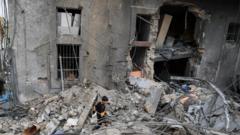The ongoing conflict between Israel and Hamas reached another impasse when Hamas rejected a ceasefire proposal from Israel that demanded the disarmament of its armed wing. The proposal was evaluated by a senior Palestinian official who indicated that it failed to address critical Israeli troop withdrawal and end-of-war commitments. As Israel continues its military operations in Gaza, recent air strikes have exacerbated the humanitarian crisis, with a UN agency reporting the worst conditions in 18 months. Amidst the chaos, both sides are engaged in fervent negotiations regarding hostages.
Hamas Dismisses Israeli Ceasefire Proposal Amid Ongoing Conflict

Hamas Dismisses Israeli Ceasefire Proposal Amid Ongoing Conflict
A senior Palestinian official confirms Hamas's rejection of an Israeli ceasefire proposal that involved disarmament demands, as humanitarian conditions in Gaza worsen.
In detail, the ceasefire proposal relayed through Egyptian intermediaries included calls for Hamas to disarm without any guarantee of an end to hostilities or a timeline for Israeli troop withdrawal. This lack of reciprocity was viewed unfavorably by Hamas, leading to their outright rejection. Current military escalations have resulted in severe civilian casualties and infrastructural devastation, with the UN reporting nearly 400,000 new displacements within Gaza amid ongoing attacks.
The delicate balance of negotiations reflects both internal and external pressures, as Israeli public opinion appears to favor a ceasefire and the release of hostages over further military escalation. However, Prime Minister Benjamin Netanyahu faces significant political pushback from hardline allies who oppose any resolution that might compromise military objectives or conclude the conflict prematurely. As the humanitarian situation deteriorates and military operations intensify, the possibility for a negotiated peace remains tenuous, with ongoing discussions still far from fruitful.
Given this complex narrative, both humanitarian concerns and political dynamics heavily influence the trajectory of this conflict. With hostages at stake and a polarized response to military directives, the path forward remains clouded with uncertainty, leaving the global community anxiously observing the potential for escalation or resolution.
The delicate balance of negotiations reflects both internal and external pressures, as Israeli public opinion appears to favor a ceasefire and the release of hostages over further military escalation. However, Prime Minister Benjamin Netanyahu faces significant political pushback from hardline allies who oppose any resolution that might compromise military objectives or conclude the conflict prematurely. As the humanitarian situation deteriorates and military operations intensify, the possibility for a negotiated peace remains tenuous, with ongoing discussions still far from fruitful.
Given this complex narrative, both humanitarian concerns and political dynamics heavily influence the trajectory of this conflict. With hostages at stake and a polarized response to military directives, the path forward remains clouded with uncertainty, leaving the global community anxiously observing the potential for escalation or resolution.



















